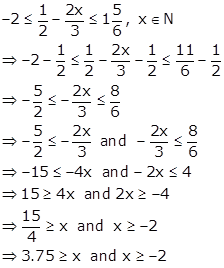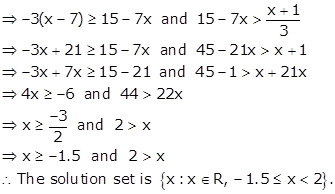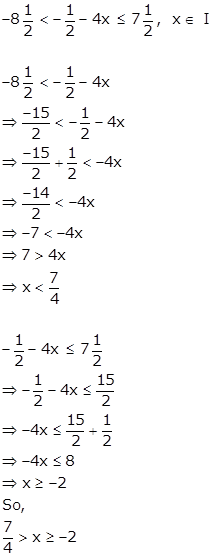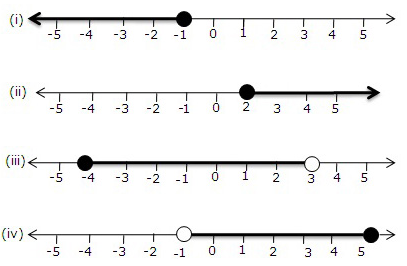Represent the following inequalities on real number lines:
![]()
![]()
![]()
![]()
![]()
![]()
![]()

Solution on number line is:
![]()

Solution on number line is:


Solution on number line is:
![]()
![]()
Solution on number line is:
![]()
![]()
Solution on number line is:
![]()
![]()
Solution on number line is:
![]()
![]()
Solution on number line is:
![]()
For each graph given, write an inequation taking x as the variable:

For the following inequations, graph the solution set on the real number line:
![]()

The solution set on the real number line is:
![]()

The solution set on the real number line is:
![]()
Represent the solution of each of the following inequalities on the real number line:
![]()
![]()
![]()
![]()
![]()
![]()

The solution on number line is as follows:


The solution on number line is as follows:

![]()
The solution on number line is as follows:


The solution on number line is as follows:


The solution on number line is:

The solution on number line is:
x ![]() {real numbers} and -1 < 3 - 2x
{real numbers} and -1 < 3 - 2x ![]() 7, evaluate x and represent it on a number line.
7, evaluate x and represent it on a number line.
-1 < 3 - 2x ![]() 7
7
-1 < 3 - 2x and 3 - 2x ![]() 7
7
2x < 4 and -2x ![]() 4
4
x < 2 and x ![]() -2
-2
Solution set = {-2 ![]() x < 2, x
x < 2, x ![]() R}
R}
Thus, the solution can be represented on a number line as:

List the elements of the solution set of the inequation
-3 < x - 2 ![]() 9 - 2x; x
9 - 2x; x ![]() N.
N.
-3 < x - 2 ![]() 9 - 2x
9 - 2x
-3 < x - 2 and x - 2 ![]() 9 - 2x
9 - 2x
-1 < x and 3x ![]() 11
11
-1 < x ![]()
![]()
Since, x ![]() N
N
![]() Solution set = {1, 2, 3}
Solution set = {1, 2, 3}
Find the range of values of x which satisfies
![]()
Graph these values of x on the number line.
![]()
![]()
![]()
![]()
![]() -3
-3 ![]() x and x < 3
x and x < 3
![]() -3
-3 ![]() x < 3
x < 3
The required graph of the solution set is:

Find the values of x, which satisfy the inequation:
![]()
Graph the solution on the number line.

Thus, the solution set is {x ∊ N: -2 ≤ x ≤3.75}
Since x ∊ N, the values of x are 1, 2, 3
The solution on number line is given by

Given x ![]() {real numbers}, find the range of values of x for which -5
{real numbers}, find the range of values of x for which -5 ![]() 2x - 3 < x + 2 and represent it on a number line.
2x - 3 < x + 2 and represent it on a number line.
-5 ![]() 2x - 3 < x + 2
2x - 3 < x + 2
-5 ![]() 2x - 3 and 2x - 3 < x + 2
2x - 3 and 2x - 3 < x + 2
-2 ![]() 2x and x < 5
2x and x < 5
-1 ![]() x and x < 5
x and x < 5
![]() Required range is -1
Required range is -1 ![]() x < 5.
x < 5.
The required graph is:

If 5x - 3 ![]() 5 + 3x
5 + 3x ![]() 4x + 2, express it as a
4x + 2, express it as a ![]() x
x ![]() b and then state the values of a and b.
b and then state the values of a and b.
5x - 3 ![]() 5 + 3x
5 + 3x ![]() 4x + 2
4x + 2
5x - 3 ![]() 5 + 3x and 5 + 3x
5 + 3x and 5 + 3x ![]() 4x + 2
4x + 2
2x ![]() 8 and -x
8 and -x ![]() -3
-3
x ![]() 4 and x
4 and x ![]() 3
3
Thus, 3 ![]() x
x ![]() 4.
4.
Hence, a = 3 and b = 4.
Solve the following inequation and graph the solution set on the number line:
2x - 3 < x + 2 ![]() 3x + 5, x
3x + 5, x ![]() R.
R.
2x - 3 < x + 2 ![]() 3x + 5
3x + 5
2x - 3 < x + 2 and x + 2 ![]() 3x + 5
3x + 5
x < 5 and -3 ![]() 2x
2x
x < 5 and -1.5 ![]() x
x
Solution set = {-1.5 ![]() x < 5}
x < 5}
The solution set can be graphed on the number line as:
![]()
Solve and graph the solution set of:
(i) 2x - 9 < 7 and 3x + 9 ![]() 25, x
25, x ![]() R
R
(ii) 2x - 9 ![]() 7 and 3x + 9 > 25, x
7 and 3x + 9 > 25, x ![]() I
I
(iii) x + 5 ![]() 4(x - 1) and 3 - 2x < -7, x
4(x - 1) and 3 - 2x < -7, x ![]() R
R
(i) 2x - 9 < 7 and 3x + 9 ![]() 25
25
2x < 16 and 3x ![]() 16
16
x < 8 and x ![]() 5
5![]()
![]() Solution set = { x
Solution set = { x ![]() 5
5![]() , x
, x ![]() R}
R}
The required graph on number line is:

(ii) 2x - 9 ![]() 7 and 3x + 9 > 25
7 and 3x + 9 > 25
2x ![]() 16 and 3x > 16
16 and 3x > 16
x ![]() 8 and x > 5
8 and x > 5![]()
![]() Solution set = {5
Solution set = {5![]() < x
< x ![]() 8, x
8, x ![]() I} = {6, 7, 8}
I} = {6, 7, 8}
The required graph on number line is:
![]()
(iii) x + 5 ![]() 4(x - 1) and 3 - 2x < -7
4(x - 1) and 3 - 2x < -7
9 ![]() 3x and -2x < -10
3x and -2x < -10
3 ![]() x and x > 5
x and x > 5
![]() Solution set = Empty set
Solution set = Empty set
Solve and graph the solution set of:
(i) 3x - 2 > 19 or 3 - 2x ![]() -7, x
-7, x ![]() R
R
(ii) 5 > p - 1 > 2 or 7 ![]() 2p - 1
2p - 1 ![]() 17, p
17, p ![]() R
R
(i) 3x - 2 > 19 or 3 - 2x ![]() -7
-7
3x > 21 or -2x ![]() -10
-10
x > 7 or x ![]() 5
5
Graph of solution set of x > 7 or x ![]() 5 = Graph of points which belong to x > 7 or x
5 = Graph of points which belong to x > 7 or x ![]() 5 or both.
5 or both.
Thus, the graph of the solution set is:

(ii) 5 > p - 1 > 2 or 7 ![]() 2p - 1
2p - 1 ![]() 17
17
6 > p > 3 or 8 ![]() 2p
2p ![]() 18
18
6 > p > 3 or 4 ![]() p
p ![]() 9
9
Graph of solution set of 6 > p > 3 or 4 ![]() p
p ![]() 9
9
= Graph of points which belong to 6 > p > 3 or 4 ![]() p
p ![]() 9 or both
9 or both
= Graph of points which belong to 3 < p ![]() 9
9
Thus, the graph of the solution set is:

The diagram represents two inequations A and B on real number lines:


(i) Write down A and B in set builder notation.
(ii) Represent A ![]() B and A
B and A ![]() B' on two different number lines.
B' on two different number lines.
(i) A = {x ![]() R: -2
R: -2 ![]() x < 5}
x < 5}
B = {x ![]() R: -4
R: -4 ![]() x < 3}
x < 3}
(ii) A ![]() B = {x
B = {x ![]() R: -2
R: -2 ![]() x < 5}
x < 5}
It can be represented on number line as:
![]()
B' = {x ![]() R: 3 < x
R: 3 < x ![]() -4}
-4}
A ![]() B' = {x
B' = {x ![]() R: 3
R: 3 ![]() x < 5}
x < 5}
It can be represented on number line as:
![]()
Use real number line to find the range of values of x for which:
(i) x > 3 and 0 < x < 6
(ii) x < 0 and -3 ![]() x < 1
x < 1
(iii) -1 < x ![]() 6 and -2
6 and -2 ![]() x
x ![]() 3
3
(i) x > 3 and 0 < x < 6
Both the given inequations are true in the range where their graphs on the real number lines overlap.
The graphs of the given inequations can be drawn as:
x > 3
![]()
0 < x < 6
![]()
From both graphs, it is clear that their common range is
3 < x < 6
(ii) x < 0 and -3 ![]() x < 1
x < 1
Both the given inequations are true in the range where their graphs on the real number lines overlap.
The graphs of the given inequations can be drawn as:
x < 0
![]()
-3 ![]() x < 1
x < 1
![]()
From both graphs, it is clear that their common range is
-3 ![]() x < 0
x < 0
(iii) -1 < x ![]() 6 and -2
6 and -2 ![]() x
x ![]() 3
3
Both the given inequations are true in the range where their graphs on the real number lines overlap.
The graphs of the given inequations can be drawn as:
-1 < x ![]() 6
6
![]()
-2 ![]() x
x ![]() 3
3
![]()
From both graphs, it is clear that their common range is
-1 < x ![]() 3
3
Illustrate the set {x: -3 ![]() x < 0 or x > 2, x
x < 0 or x > 2, x ![]() R} on the real number line.
R} on the real number line.
Graph of solution set of -3 ![]() x < 0 or x > 2
x < 0 or x > 2
= Graph of points which belong to -3 ![]() x < 0 or x > 2 or both
x < 0 or x > 2 or both
Thus, the required graph is:
![]()
Given A = {x: -1 < x ![]() 5, x
5, x ![]() R} and B = {x: -4
R} and B = {x: -4 ![]() x < 3, x
x < 3, x ![]() R}
R}
Represent on different number lines:
(i) A ![]() B
B
(ii) A' ![]() B
B
(iii) A - B
(i) A ![]() B = {x: -1 < x < 3, x
B = {x: -1 < x < 3, x ![]() R}
R}
It can be represented on a number line as:
![]()
(ii) Numbers which belong to B but do not belong to A' = B - A
A' ![]() B = {x: -4
B = {x: -4 ![]() x
x ![]() -1, x
-1, x ![]() R}
R}
It can be represented on a number line as:
![]()
(iii) A - B = {x: 3 ![]() x
x ![]() 5, x
5, x ![]() R}
R}
It can be represented on a number line as:
![]()
P is the solution set of 7x - 2 > 4x + 1 and Q is the solution set of 9x - 45 ![]() 5(x - 5); where x
5(x - 5); where x ![]() R. Represent:
R. Represent:
(i) P ![]() Q
Q
(ii) P - Q
(iii) P ![]() Q'
Q'
on different number lines.

and

(i) ![]()
![]()
(ii) P - Q = {x: 1 < x < 5, x ![]() R}
R}
![]()
(iii) ![]() {x: 1 < x < 5, x
{x: 1 < x < 5, x ![]() R}
R}
![]()
Question 19
Question 20
Find the range of values of x, which satisfy:
![]()
Graph, in each of the following cases, the values of x on the different real number lines:
(i) x ![]() W (ii) x
W (ii) x ![]() Z (iii) x
Z (iii) x ![]() R
R

(i)If x ![]() W, range of values of x is {0, 1, 2, 3, 4, 5, 6}.
W, range of values of x is {0, 1, 2, 3, 4, 5, 6}.
![]()
(ii) If x ![]() Z, range of values of x is {-4, -3, -2, -1, 0, 1, 2, 3, 4, 5, 6}.
Z, range of values of x is {-4, -3, -2, -1, 0, 1, 2, 3, 4, 5, 6}.
![]()
(iii)If x ![]() R, range of values of x is
R, range of values of x is ![]() .
.
![]()
Given: A = {x: -8 < 5x + 2 ![]() 17, x
17, x ![]() I}, B = {x: -2
I}, B = {x: -2 ![]() 7 + 3x < 17, x
7 + 3x < 17, x ![]() R}
R}
Where R = {real numbers} and I = {integers}. Represent A and B on two different number lines. Write down the elements of A ![]() B
B
A = {x: -8 < 5x + 2 ![]() 17, x
17, x ![]() I}
I}
= {x: -10 < 5x ![]() 15, x
15, x ![]() I}
I}
= {x: -2 < x ![]() 3, x
3, x ![]() I}
I}
It can be represented on number line as follows:
![]()
B = {x: -2 ![]() 7 + 3x < 17, x
7 + 3x < 17, x ![]() R}
R}
= {x: -9 ![]() 3x < 10, x
3x < 10, x ![]() R}
R}
= {x: -3 ![]() x < 3.33, x
x < 3.33, x ![]() R}
R}
It can be represented on number line as follows:

A ![]() B = {-1, 0, 1, 2, 3}
B = {-1, 0, 1, 2, 3}
Solve the following inequation and represent the solution set on the number line 2x - 5 ≤ 5x +4 < 11, where x![]() I
I
2x - 5 ≤ 5x + 4 and 5x +4 < 11
2x - 9 ≤ 5x and 5x < 11 - 4
-9 ≤ 3x and 5x < 7
x ![]() - 3 and x <
- 3 and x < ![]()
x ![]() - 3 and x <
- 3 and x < ![]()
Since x![]() I, the solution set is
I, the solution set is ![]()
And the number line representation is
![]()
Given that x ![]() I, solve the inequation and graph the solution on the number line:
I, solve the inequation and graph the solution on the number line:
![]()

Solution set = {5, 6}
It can be graphed on number line as:
![]()
Given:
A = {x: 11x - 5 > 7x + 3, x ![]() R} and
R} and
B = {x: 18x - 9 ![]() 15 + 12x, x
15 + 12x, x ![]() R}.
R}.
Find the range of set A ![]() B and represent it on number line.
B and represent it on number line.
A = {x: 11x - 5 > 7x + 3, x ![]() R}
R}
= {x: 4x > 8, x ![]() R}
R}
= {x: x > 2, x ![]() R}
R}
B = {x: 18x - 9 ![]() 15 + 12x, x
15 + 12x, x ![]() R}
R}
= {x: 6x ![]() 24, x
24, x ![]() R}
R}
= {x: x ![]() 4, x
4, x ![]() R}
R}
Range of A ![]() B = {x: x
B = {x: x ![]() 4, x
4, x ![]() R}
R}
It can be represented on number line as:
![]()
Find the set of values of x, satisfying:
7x + 3 ![]() 3x - 5 and
3x - 5 and ![]() , where x
, where x ![]() N.
N.
7x + 3![]() 3x - 5
3x - 5
4x ![]() -8
-8
x ![]() -2
-2

Since, x ![]() N
N
![]() Solution set = {1, 2, 3, 4, 5}
Solution set = {1, 2, 3, 4, 5}
Solve:
(i) ![]() , where x is a positive odd integer.
, where x is a positive odd integer.
(ii) ![]() , where x is a positive even integer.
, where x is a positive even integer.
(i) ![]()

Since, x is a positive odd integer
![]() Solution set = {1, 3, 5}
Solution set = {1, 3, 5}
(ii) ![]()

Since, x is a positive even integer
![]() Solution set = {2, 4, 6, 8, 10, 12, 14}
Solution set = {2, 4, 6, 8, 10, 12, 14}
Solve the inequation:
![]() , x
, x ![]() W. Graph the solution set on the number line.
W. Graph the solution set on the number line.

Since, x ![]() W
W
![]() Solution set = {0, 1, 2}
Solution set = {0, 1, 2}
The solution set can be represented on number line as:
![]()
Find three consecutive largest positive integers such that the sum of one-third of first, one-fourth of second and one-fifth of third is atmost 20.
According to the given statement,

Thus, the largest value of the positive integer x is 24.
Hence, the required integers are 24, 25 and 26.
Solve the given inequation and graph the solution on the number line.
![]()
2y - 3 < y + 1 ![]() 4y + 7, y
4y + 7, y ![]() R
R
![]() 2y - 3 - y < y + 1 - y
2y - 3 - y < y + 1 - y ![]() 4y + 7 - y
4y + 7 - y
![]() y - 3 < 1
y - 3 < 1 ![]() 3y + 7
3y + 7
![]() y - 3 < 1 and 1
y - 3 < 1 and 1![]() 3y + 7
3y + 7
![]() y < 4 and 3y
y < 4 and 3y ![]() - 6
- 6 ![]() y
y ![]() - 2
- 2
![]() - 2
- 2 ![]() y < 4
y < 4
The graph of the given equation can be represented on a number line as:
![]()
Solve the inequation:
3z - 5 ![]() z + 3 < 5z - 9, z
z + 3 < 5z - 9, z ![]() R.
R.
Graph the solution set on the number line.
3z - 5 ![]() z + 3 < 5z - 9
z + 3 < 5z - 9
3z - 5 ![]() z + 3 and z + 3 < 5z - 9
z + 3 and z + 3 < 5z - 9
2z ![]() 8 and 12 < 4z
8 and 12 < 4z
z ![]() 4 and 3 < z
4 and 3 < z
Since, z ![]() R
R
![]() Solution set = {3 < z
Solution set = {3 < z ![]() 4, Z
4, Z ![]() R }
R }
It can be represented on a number line as:
![]()
Solve the following inequation and represent the solution set on the number line.
-3 < ![]()
![]() R
R

The solution set can be represented on a number line as:
![]()
Solve the following inequation and represent the solution set on the number line:
![]()
Consider the given inequation:

⇒ -4 ≤ x < 5; where x ∊ R
The solution set can be represented on a number line as follows:

Solve the following in equation, write the solution set and represent it on the number line:
![]()




![]()
Solve the following in equation and write the solution set:
13x - 5 < 15x + 4 < 7x + 12, x ∈ R
Represent the solution on a real number line.


Solve the following inequation, write the solution set and represent it on the number line.
![]()
![]()

The solution set is represented on number line as follows:
![]()
Solve the following inequation and represent the solution set on a number line.
![]()

As, ![]()
![]()







No comments:
Post a Comment